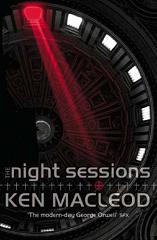
The Night Sessions
Ken MacLeod
324 pages
published in 2008
It was only when Ken ran a blurb on his blog for a promotion event for his new novel, that I realised that I hadn’t read his previous one The Night Sessions yet. So when my sweetie was running an Amazon order anyway and asked me what I wanted as a gift, this is what I asked for. Glad I did too, as it is of the usual high quality I expect from Ken.
You could call The Night Sessions a thematic sequel to The Execution Channel. That novel took place at the height of a decades long extension of the War Against Terror, while this takes place some decades after the end of what’s now called the Faith Wars in the US/UK, the Oil Wars anywhere else. Ended in a defeat for the coalition of the willing, it led to serious political repercussions in the west: the UK has disintegrated, the US is undergoing a second civil war (something Ken has used before) and in Scotland, as elsewhere religion is well and truly disestablished. There’s not just a separation of church and state, but an official constitutional police of no cognisance: the state doesn’t recognise priests, vicars, bishops, mullars or other religious offices, not even on the level of acknowledging their titles. It’s a world that fits in with Ken’s current hardline secularist attitude, as witnessed by his blog.
Against this background a priest is blown up in his home in Edinburgh and detective inspector Adam Ferguson has to solve this murder. Since it’s years since the violence of the Second Enlightment and political terrorism has largely disappeared (one minor character expresses surprise at the continuing existence of the bomb squad) Ferguson has his work cut out for him. This part of the book reminded me a bit of Charlie Stross’ Halting State in that they share a similar view of detective work a few decades down the road: police wikis, interactive computer generated views overlapping physical reality and all that sort of cool shit. MacLeod goes Stross one further though, with the lekis: robots looking like “a two-metre tall scale model of a Martian fighting machine from War of the Worlds” with proper artificial intelligence, another (inadvertent) spinoff of the Faith Wars. Ferguson himself is a calm family man who has seen some bad things during the Faith Wars and does his best to suppress it, an average bloke doing the best he can in his job.
That’s one storyline. The other stars John Campbell, a young New Zealand Christian and robot technician on the Waimango Park, which is run by the fundamentalist Genesis Institute in which the natural landscape of the park is disneyfied into evidence for flood geology and such. Campbell is skeptical of this sort of creation science, believing that you should believe without evidence rather than attempt to explain the world with pseudoscience. New Zealand has become somewhat of a refuge for fundamentalist Americans fleeing the aftermath of the Second Civil War and the creationist takeover of Waimango Park is one result of it. Oddly enough the park has also become a refuge for an entirely different sort of intelligent being, housing roughly a quarter of still existing humanoid robots, a Sony marketing failure as it turned out people weren’t so much comforted as creeped out by humanoid robots. Campbell believes such robots can have souls as well and has created a congregation amongst some of them. Unknownst to him, his congregation has broadcast his sermons to interested robots around the world, which has led him to a small group of fundies in Scotland, the Kirk Session of the Free Congregation of West Lothian, spiritual brethern.
Campbell is MacLeod’s attempt to create a truly sympathetic, smart fundamentalist character, in which he doesn’t quite succeed, if only because he’s a bit too perfect and nice. He’s a bit too eager to be talked out of his prejudices. It’s as if MacLeod can’t quite bring himself to create somebody obviously intelligent yet still a proper Christian, with all the accompanying nasty beliefs.
Of course the two storylines converge, as Ferguson’s investigation progresses while more murders take place, while at the other end of the world Campbell starts doubting a few things. The murders turn out not to be simple terrorism, not to be the work of some fanatical atheists eager to push the boundaries of no cognisance, nor of followers of some competiting religion. Campbell’s doubts meanwhile turn out to be justified and slowly through the intersections of the two storylines what’s really going on becomes clear.
Yet there’s a third story taking place, right under our noses but never explicitely referenced until the end of the novel, just like there was in The Execution Channel and which puts the other stories into context. Much of what happens in The Night Sessions is a red herring, what’s important is what’s happening when robots find religion and the question “are you saved” is more than just a metaphysical one…
The Night Sessions is quite a short book and MacLeod’s writing is fairly terse, more often alluding and hinting than providing fully coloured in pictures, though he does’t eschew the small infodump either. I’m not sure I quite buy the future he images, though logical enough in parts. The whole Faith Wars thing strikes me as dated already, a byproduct of the Bush-Blair war on terror, something that has been derailed now they’re gone. The reaction to the wars as well is too extreme to be entirely believable, at least not in the bare sketches MacLeod provides.